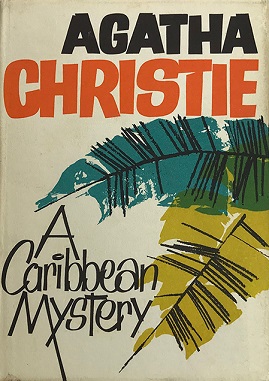- first published 1964
- A Miss Marple mystery
- this edition Paul Hamlyn AC Crime Collection
- pp7-151
- Full plot on Wikipedia
Jane Marple grapples with a murderous heat when a fellow hotel guest drops dead, just as he's about to share a most astonishing photograph.
Miss Marple finally takes a trip abroad, the only time she would leave her native shores to solve a murder. This novel introduced Jason Rafiel, who would strike up an unusual friendship with Miss Marple. The two couldn't be more different but develop a begrudging respect for each other. So much so that Rafiel would posthumously call on Miss Marple’s skills of detection in the novel Nemesis.
A Caribbean Mystery is dedicated to John Cruikshank Rose, "with happy memories of my visit to the West Indies". Agatha Christie and her second husband Max Mallowan's friendship with John Rose started back in 1928, at the archaeological site at Ur, the same site where they met each other.
My Take
 This novel set in the late 1950s?? reflects how much things have changed in Britain since the Second World War. Not only are people travelling again, with even Miss Marple taking an overseas holiday, but young Brits are investing overseas (the Kendals have bought a boutique hotel) and business men like Mr Rafiel can conduct their businesses by telegram. [The author has been to the West Indies].
This novel set in the late 1950s?? reflects how much things have changed in Britain since the Second World War. Not only are people travelling again, with even Miss Marple taking an overseas holiday, but young Brits are investing overseas (the Kendals have bought a boutique hotel) and business men like Mr Rafiel can conduct their businesses by telegram. [The author has been to the West Indies].There is also some reflection on Britain's past as a leader of an Empire, as Major Palgrave refers to his experiences in both Africa and India.
By today's standards this is also a short novel. One of the themes is the community rumopur mill. For example who was it that first said that Major Palgrave had blood pressure problems? Nobody can remember but everybody automatically thought of it when he was found dead. Another issue Miss Marple thinks about is how much we accept what people say either about themselves or those whom they are associated with. In a village like St. Mary Mead you actually know a person's history, but when you are on holiday you accept what fellow holiday makers says about themselves at face value because you have no means of checking it. So how much of what you learn is the truth?
Just as in the Hercule Poirot novels Agatha Christie began to introduce characters that he could confide in or test his ideas on, so she does the same thing in the Miss Marple novels. In St. Mary Mead Jane Marple uses someone she knows well, her friend Dolly, or the doctor, but in this novel she must assess which of her fellow holidaymakers is best. The doctor is inclined to treat her with some suspicion, the Canon's sister doesn't really have the depth of understanding, and so she uses an elderly man, Jason Rafiel, who is an invalid. Their's is an interesting relationship, after he comes to recognise Miss Marple's deductive powers.
My rating: 4.4
Check the review at Christie in a Year. (lots of depth)
I read this as the 56th novel in the Agatha Christie Reading Challenge.
My calculation is that I probably have eleven novels to go, so I will finish sometime late next year.

2 comments:
I enjoyed this one many years ago, but probably need to revisit it, don't remember who did it.
Another one of my favourites, though the depiction of the local population is a bit cringeworthy. It is a clever one, and interesting too in that there's a sort of sequel in Nemesis.
Post a Comment